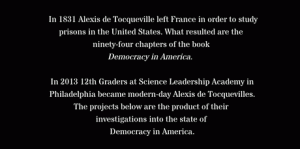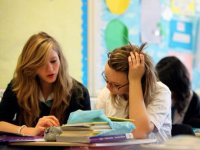Collaboration Matters
Blogger's note: This post focuses on the importance of integrating collaboration into classroom practice. In my next post, I'll talk about strategies for successful facilitation of collaborative work.
A Learned Skill
Sharing my rough writing with others is a miserable experience. I know that outside input is a crucial part of revision, yet I squirm uncomfortably as those I trust make comments and probe with questions. Inevitably, I begin to feel resentment grow as I am forced to reevaluate passages that I thought were clear.
If collaboration feels this challenging for me with those whom I trust and respect, it must feel even harder for my students because:
- I often make a point of dividing them into heterogeneous groups that include students with different skill levels.
- The projects I assign require agreement and coordination between all the members of a group.
- I expect the final products to be polished and ready for a wider audience.
Despite these difficulties, I believe that it would be a huge mistake to teach in a way that did not emphasize collaboration. Each year, as a result of different collaborative experiences, my classroom is transformed from a random collection of individuals into a supportive learning community. The collective effort and exchange of ideas lead to final products and understanding that would not be possible if students were working in isolation. These collaborative relationships between students are the result of intentional effort, careful planning, modeling and facilitation. I am frequently reminded that collaboration is a learned skill.
Why Emphasize Collaboration?
Learning is a social process, and the learning process is deepened when ideas are challenged and learners are pushed to produce work that surpasses their expectations of what they can do. That said, working in groups is a continually challenging process. It is important that students aren't forced to work together on projects where collaboration isn't necessary or beneficial to the final product.
Collaborative projects are a strategy to shift the focus away from the teacher as sole authority, evaluator and audience for student work. This democratization of the classroom provides multiple opportunities for learning beyond traditional content. Collaboration makes our classrooms places of exploration and exchange where students gain deeper knowledge of themselves, their potential and their roles in a community.
Collaborative scenarios can include:
- Investigation of an issue
- Exchange of ideas
- Sharing and delegation of tasks
- Peer review
- Feedback on a final product
Here are some links to specific examples of projects that integrated meaningful collaboration into the process of creation:
- This peer edit form was used to structure collaborative feedback on rough versions of a research paper.
- This rubric for an English class podcasting project addressed multiple stages that were done by different group members exercising a range of different skills.
- Below is a screenshot linked to an example of a larger, multi-month project that my 12th grade students recently completed. The project involved collaborative idea generation and editing for individual chapters that are part of a larger, public, collective final product.

A Shared Experience
John Dewey believed that education must be " . . . a process of living and not a preparation for future living." This powerful idea is a helpful reminder of the rich, insightful growth and knowledge that can come from deep, collaborative learning experiences.
How do you approach collaboration within the classroom? Please share your thoughts below.
